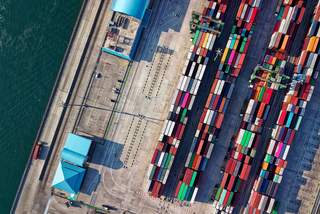
©
The Crisis of the WTO
The overarching goal of the WTO is to remove barriers to trade worldwide. This is to be achieved through binding, non-discriminatory rules. Thus, the negotiation of new rules for market access is designated the first pillar of the WTO. However, besides the Trade Facilitation Agreement in 2017, member states have had significant challenges coming to multilateral consensus, not formally concluding the large-scale Doha negotiation round. The 12th Ministerial Conference did deliver an unexpected multilateral package, but nonetheless disagreement remains on the path forward.
Crisis of Ambition and Distortion
The reform gridlock threatens to make the World Trade Organisation less relevant for business. After all, global trade continues to develop in a dynamic way – through technological progress and digitalisation, but also the increasing significance of global competition issues linked to the economic ascent of state-capitalist China. The Trilateral Initiative has delivered promising proposals on reform of the Agreement on Subsidies and Countervailing Measures and the EU proposed in its Trade Strategy to establish new rules that address this as well as the behaviour of state-owned enterprises and the misuse of special and differential treatment. None of these areas is appropriately multilaterally regulated in a WTO context.
Crisis of Framework
The EU and other like-minded partners currently work diligently on plurilateral agreements between ambitious members. Plurilateral negotiations are being conducted on digital trade (e-commerce), investment facilitation, trade and gender, and small- and medium-sized enterprises. German industry hopes to see conclusion on e-commerce and investment facilitation by the first half of 2023. Such agreements could ideally lead to multilateral rulemaking at a later stage. Unfortunately, India and South Africa have stood in the way recently of allowing plurilaterals into the multilateral framework and threaten to halt progress. Nevertheless, the WTO can only move with the times and hold onto its relevance if it soon demonstrates new successes.
Crisis of Transparency
Next to the negotiation of new trade rules, another important WTO pillar is monitoring of compliance with already established WTO rules. This includes the collection of trade data in order to make trends in global trade transparent and to analyse them. The entrance of the WTO onto the world stage as a think tank is often thought of as a further pillar of the organization. The foundation for monitoring and transparency, however, is that the members duly notify the trade-facilitating and trade-restrictive measures they have introduced to the WTO. This obligation to notify is unfortunately not being met adequately. The number of members that have not notified subsidies has risen sharply in recent years, which implies that unreported subsidies are also increasing. Four agreements at MC12 included reference to notification, but often in much weaker language without enforcement mechanisms, even with positive incentives. German industry therefore supports proposals for more effective notification rules and new sanction options.
Crisis of Dispute Settlement
Another central pillar of the WTO is dispute settlement, which enables member states to act against potential violations of global trade law and to systematically resolve disputes. However, since December 2019, the second instance of the dispute settlement mechanism has been paralyzed by a U.S. blockade of the appointment of new Appellate Body members. A binding resolution of current and new disputes is not possible at the moment; several reform initiatives to overcome the blockade were not able to find support from United States.
The EU and 19 other WTO members, including Brazil, Canada, and China, have therefore established a pragmatic interim solution. Since April 2020, the Multi-Party Interim Appeal Arbitration Arrangement (MPIA) allows participants, among one another, to continue to benefit from a functioning two-stage dispute settlement system. Under the umbrella of the WTO, the mechanism provides the MPIA signatory states with an independent and binding appeals body, which will be dissolved as soon as the WTO’s multilateral Appellate Body is once again operational.
It is promising that the MPIA has now processed two cases with strict timelines but must remain a stopgap solution. In addition, at MC12 member states were able to commit to a “fully and well-functioning” dispute settlement mechanism by 2024, and technical discussions have commenced under U.S. initiative. However, these negotiations must intensify and U.S. concerns resolved in consensus with all other members.
BDI remains confident in the WTO. With Dr. Okonjo-Iweala in office and an unexpected multilateral consensus reached, it is not unlikely that a more constructive spirit of cooperation will be restored in Geneva. All WTO members have a strong common interest in an orderly, functioning world trade system. However, sticking points including the role of the plurilaterals, competitive distortion issues, and transparency and notification must be overcome or alternative structures must come into play.



